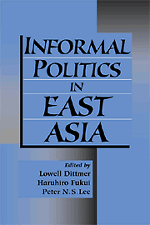Book contents
- Frontmatter
- Contents
- Preface
- Contributors
- INTRODUCTION: On the Significance of Informal Politics
- PART I Informal Politics in Industrialized Asian Democracies
- PART II Dictatorship with Chinese Characteristics: Macroperspectives
- PART III Case Studies in Chinese Corporatism
- 8 Organizational Involution and Sociopolitical Reform in China: An Analysis of the Work Unit
- 9 Clientage in the PRC's National Defense Research and Development Sector
- PART IV Asian Authoritarianism on the Chinese Periphery
- CONCLUSION: East Asian Informal Politics in Comparative Perspective
- Glossary
- Index
8 - Organizational Involution and Sociopolitical Reform in China: An Analysis of the Work Unit
Published online by Cambridge University Press: 20 May 2010
- Frontmatter
- Contents
- Preface
- Contributors
- INTRODUCTION: On the Significance of Informal Politics
- PART I Informal Politics in Industrialized Asian Democracies
- PART II Dictatorship with Chinese Characteristics: Macroperspectives
- PART III Case Studies in Chinese Corporatism
- 8 Organizational Involution and Sociopolitical Reform in China: An Analysis of the Work Unit
- 9 Clientage in the PRC's National Defense Research and Development Sector
- PART IV Asian Authoritarianism on the Chinese Periphery
- CONCLUSION: East Asian Informal Politics in Comparative Perspective
- Glossary
- Index
Summary
The danwei, an enclosed, multifunctional and self-sufficient entity, is the most basic collective unit in the Chinese political and social order. It finds its origins in the early administrative arrangements of the Red Army and the Soviets and wartime base areas, which were designed to be highly autarkic: Each military unit had responsibility for its own provisioning, training, discipline, propaganda, and morale. Unit organization was then generalized across the country in an effort to restructure society in the context of the relatively complete socioeconomic disaster (e.g., industrial destruction, hyperinflation) that followed thirty years of invasion and civil war. Although the unit is the lowest tier of the executive, it is also a production unit and social community. In its political role, the danwei functions as a mechanism through which the state controls members of the cadre corps implementing its policies among the working populace. As an economic and communal entity, the danwei fulfills the welfare and social needs of its members. Danwei membership is inclusive, entailing entitlement to a potentially infinite range of goods and services, for example, housing, bonuses, transportation subsidies, medical care, recreation, and other rationed commodities. The danwei's omnifunctionality has led to a relationship of mutual dependency between the organization and its membership that is not unlike kinship. Yet the danwei is hardly a voluntary association; rather, it is a quasipermanent, quasiascriptive identity in almost the same sense as a nationality or native place.
- Type
- Chapter
- Information
- Informal Politics in East Asia , pp. 185 - 214Publisher: Cambridge University PressPrint publication year: 2000
- 1
- Cited by



